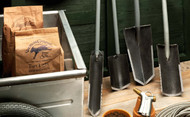We’ve always taken great pride in working with small manufacturers and individual makers—true craftspeople whose devotion to their trade is evident in the quality of their work. For this series, we’re spotlighting some of our longtime (and more recent) makers. This manufacturer makes some of the toughest, most durable digging tools you can buy. We’re honored to be able to help carry on the legacy of this family run business.

Japanese Garden Tools Vs. American: What’s the Difference?
You may have seen Japanese gardening tools popping up more in stores and online. Sure, they’re… Read More


